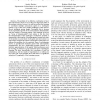Free Online Productivity Tools
i2Speak
i2Symbol
i2OCR
iTex2Img
iWeb2Print
iWeb2Shot
i2Type
iPdf2Split
iPdf2Merge
i2Bopomofo
i2Arabic
i2Style
i2Image
i2PDF
iLatex2Rtf
Sci2ools
102
click to vote
ICRA
2007
IEEE
2007
IEEE
Adaptive Play Q-Learning with Initial Heuristic Approximation
Abstract— The problem of an effective coordination of multiple autonomous robots is one of the most important tasks of the modern robotics. In turn, it is well known that the learning to coordinate multiple autonomous agents in a multiagent system is one of the most complex challenges of the state-ofthe-art intelligent system design. Principally, this is because of the exponential growth of the environment’s dimensionality with the number of learning agents. This challenge is known as “curse of dimensionality”, and relates to the fact that the dimensionality of the multiagent coordination problem is exponential in the number of learning agents, because each state of the system is a joint state of all agents and each action is a joint action composed of actions of each agent. In this paper, we address this problem for the restricted class of environments known as goal-directed stochastic games with action-penalty representation. We use a single-agent problem solution as a heuris...
ICRA 2007 | Multiagent Coordination Problem | Multiple Autonomous Agents | Multiple Autonomous Robots | Robotics |
| Added | 03 Jun 2010 |
| Updated | 03 Jun 2010 |
| Type | Conference |
| Year | 2007 |
| Where | ICRA |
| Authors | Andriy Burkov, Brahim Chaib-draa |
Comments (0)

